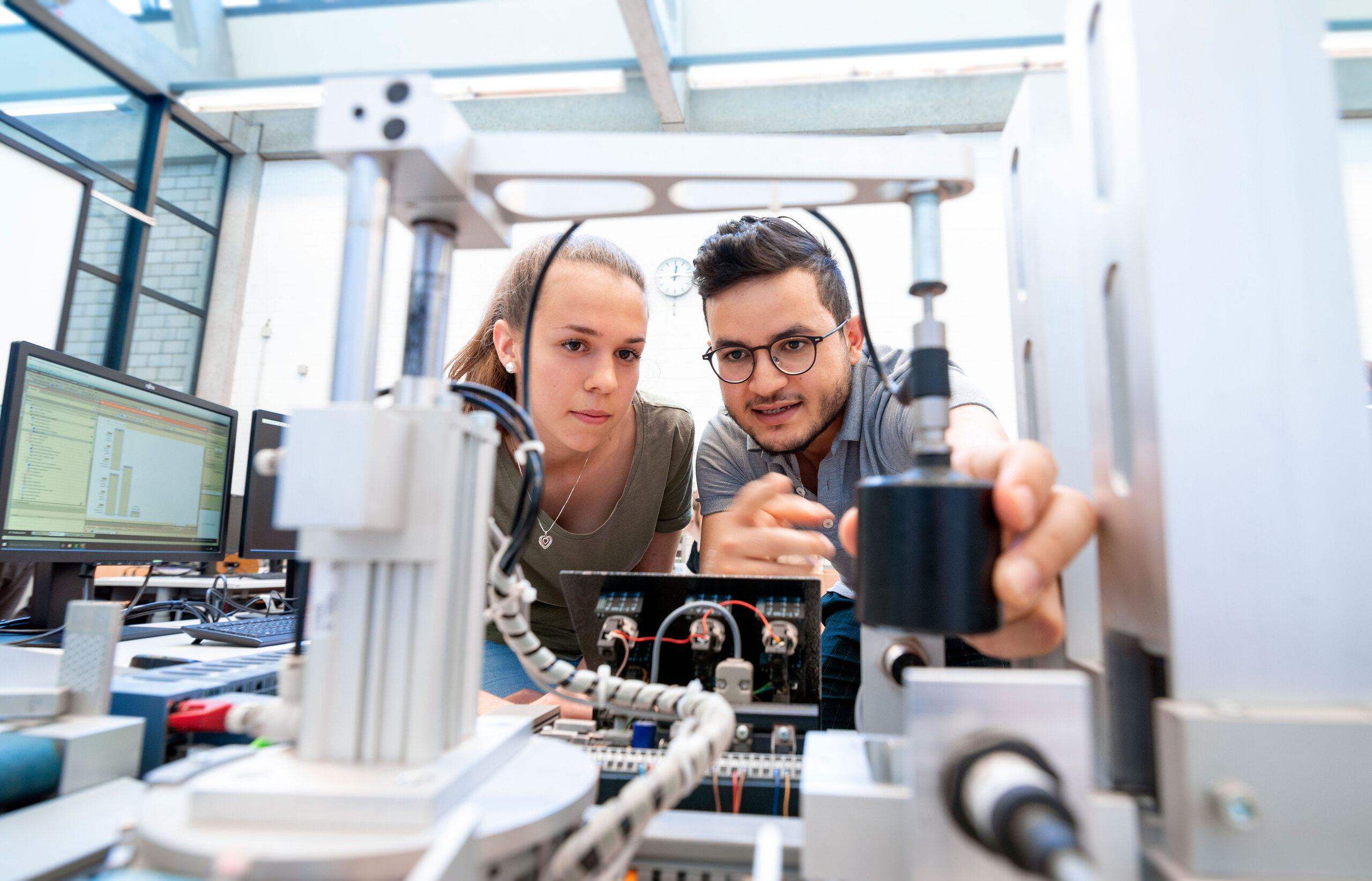
Mechatronics
Structure of the study program
The standard period of study for the Bachelor of Mechanical Engineering is seven semesters. The study program is divided into two semesters of basic studies and 5 semesters of advanced studies. Each semester 30 ECTS credit points are awarded.
In the fourth semester, you will choose one of the following specializations to follow during your studies:
- Microtechnology
- Robotics and Bionics
- Aeronautical Engineering
- Refrigeration, Air Conditioning, and Environmental Technology
In the fifth semester, you will complete an internship semester in a company of your choice. Our advisors in the Internship Board will assist you in finding and carrying out the internship.
In the Advanced Studies, it is possible, in addition to the compulsory lectures, to take elective courses from the General Studies according to your own interests.
The final Bachelor's thesis in the seventh semester can be written either at the university or in cooperation with a company - even abroad.
Students who have successfully completed their bachelor's degree can go on to study for a master's degree and specialize further professionally, e.g. with a master's degree in mechanical engineering (M.Sc.).
Contact
Faculty of Mechanical Engineering & Mechatronics
Silke Loykowski
Phone: +49 (0)721 925-1708
Fax: +49 (0)721 925-1707
silke.loykowski@h-ka.de
Office hours:
Mon.-Thur. 8 a.m.-2:30 p.m.
Fri. 8 a.m.-12 p.m.
Building F, room 114
Moltkestraße 30
76133 Karlsruhe
Schedule for your studies
Listed below you will find all the modules you will study in the individual semesters. A module consists of several courses. In the module handbook you will find detailed information about the course of studies, courses, examinations, literature as well as the ECTS awarded.
| First semester |
|---|
| Advanced Calculus 1 |
| Electronics 1 |
| Engineering Mechanics 1 |
| Computer Science 1 |
| Materials and Components |
| Second semester |
|---|
| Advanced Calculus 2 |
| Electronics 2 |
| Engineering Mechanics 2 |
| Computer Science 2 |
| CAD/Computer Aided Design |
| Third semester |
|---|
| Advanced Calculus 3 |
| Electronics 3 |
| Engineering Mechanics 3 |
| Micromechatronic Systems |
| Development/Production 1 |
| Fourth semester |
|---|
| Control Engineering |
| Actuators and Sensors |
| Development/Production 2 |
Focus Module 1 |
| Fifth semester |
|---|
| Internship preparation |
| Internship at a Company |
| Internship Follow-up |
| Sixth semester |
|---|
| Quality Management |
| Industrial Mechatronics |
| Development Project |
| Elective Module 2 |
| Focus Module 2 |
| Seventh semester |
|---|
| Information Technology |
| Mechatronic Systems for Automation |
| Preparation of the Bachelor’s Thesis |
| Bachelor’s Thesis |
| Final Colloquium |
Languages
The courses are taught in German language, individual lectures are held in English as language of instruction. At the university's own Foreign Language Institute all students can deepen their own language skills in lessons with native speakers.
Focal subjects
For the advanced studies, students choose between five focal subjects. Each focal subject has two special modules. A module consists of several courses, usually a lecture and a practical laboratory class.
| Focal subject | Study content |
|---|---|
| Refrigeration, Air Conditioning, and Environmental Technology | This specialization is aimed at future engineers of refrigeration and air conditioning solutions. The curriculum includes thermodynamics and fluid mechanics as well as refrigeration and air conditioning technology. Electives include vehicle air conditioning, compressor technology, mass transfer, alternative refrigeration and heat pumps, or ice slurry technology. |
| Microtechnology | The "Microtechnology" specialization focuses on detail: Courses include Clean Room Technology, Packaging and Interconnection Technology, Thick Film Integrated Circuits, Power Supply of Autonomous Microsystems, and the Microtechnology Laboratory. We are one of the few institutions in Karlsruhe to have our own clean room (class 1000/ISO 7) for teaching. |
| Robotics and Bionics | This specialization deals with the selection of suitable bionic functional principles in product development. This includes, for example, materials and structures, bionic design, bionic robotics/humanoid robots, structural optimization based on principles from nature, and swarm intelligence. Other courses include machine tools, handling and assembly technology, and logistics. |
| Aeronautical Engineering | "Aeronautical Engineering" teaches specific skills in aeronautical and space technology, especially in the field of aircraft structures and construction methods. Courses include Thermodynamics, Principles of Flight, Avionics & Flight Instruments, Strength of Flight Design, and various electives such as Air Traffic Control or Aircraft Engines. In one or two additional semesters, students can also acquire the license for commercial airline pilots / professional pilots for fixed-wing aircraft or helicopters (voluntary/at own expense). |